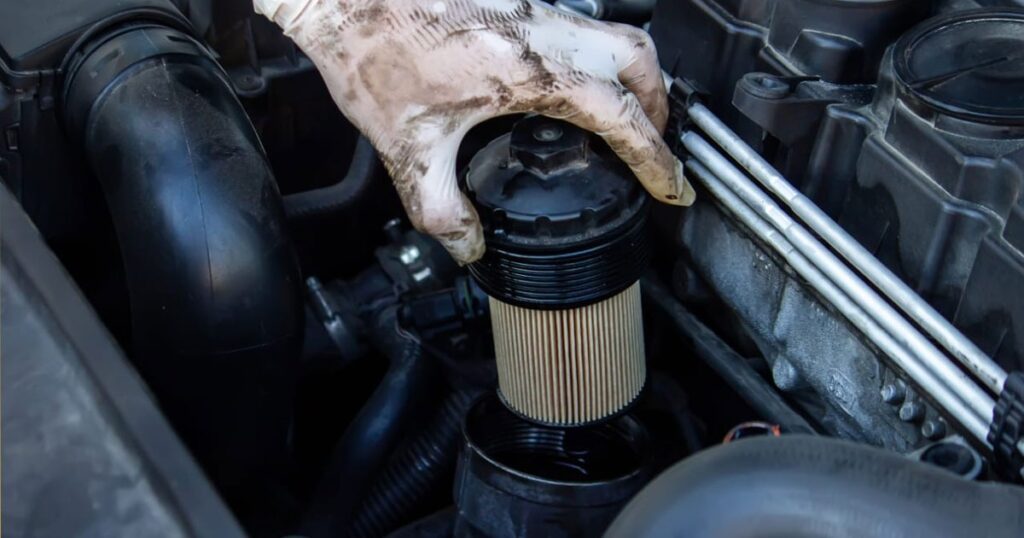Your engine needs a consistent, clean fuel supply to run efficiently. The fuel filter plays a key role by blocking contaminants from reaching the engine. If the filter gets clogged, it can limit fuel flow and cause performance problems. Recognizing the symptoms early can help you avoid costly repairs and breakdowns, or seeking help from an experienced auto repair Houston can ensure the issue is addressed promptly.
A clogged fuel filter isn’t just inconvenient; it can damage your fuel pump and injectors, reduce fuel efficiency, and even leave you stranded. This blog explains all the major clogged fuel filter symptoms, what causes them, and what you can do about it.
If you’re searching for ‘auto repair near me,’ we’re here to help — book your service today.
What Is a Fuel Filter and Why Is It Important?
The fuel filter, though small, is essential for trapping dirt, rust, and other impurities before the fuel enters your engine. Clean fuel is essential for maintaining combustion efficiency and protecting your fuel system components. Over time, the filter can become saturated with debris, especially if the fuel tank is dirty or the car is driven in dusty environments.
Without a properly functioning fuel filter, contaminants can clog fuel injectors, reduce fuel pressure, and compromise engine performance. That’s why regular inspection and timely replacement are essential to keeping your car running efficiently.If you’re unsure about the condition of your fuel system, professional fuel system services can help ensure everything is in optimal working order.
Clogged Fuel Filter Symptoms
A blocked fuel filter affects the overall flow of fuel to your engine, resulting in various performance-related symptoms. These signs may appear gradually or suddenly, depending on how clogged the filter is. Below are the key symptoms you should never ignore if you suspect a fuel delivery problem.
1. Engine Misfires or Hesitation
If the fuel filter is partially clogged, the engine might not get sufficient fuel during combustion, particularly when under heavy load. This results in hesitation, misfires, or sudden jerks while driving. You may feel a delay when pressing the accelerator or notice the engine stumbling during acceleration.
This issue is often most noticeable when climbing hills, merging onto highways, or passing other vehicles.If not addressed, frequent misfires can harm the catalytic converter and shorten the engine’s lifespan.
2. Difficulty Starting the Engine
One of the earliest symptoms of a clogged fuel filter is a slow or hard start. If the filter is restricting fuel flow, your engine may crank for longer than usual or fail to start on the first try. This is especially common after the car has been sitting overnight or during colder weather.
In severe cases, the engine might not start at all until the filter is replaced. A lack of fuel pressure makes it difficult for the engine to ignite the air-fuel mixture required for combustion.
3. Frequent Engine Stalling
Another warning sign of a clogged fuel filter is random or frequent stalling. Your engine may start normally but suddenly cut off while idling, driving, or coming to a stop. Stalling happens because the engine is temporarily starved of fuel due to inconsistent flow.
This can be dangerous, particularly if it happens at intersections or on the highway. The longer the filter remains clogged, the more frequently your engine may stall under different driving conditions.
4. Sluggish Acceleration
If your car struggles to gain speed when you press the gas pedal, a clogged fuel filter could be the culprit. Limited fuel flow reduces your engine’s power output, causing it to feel underpowered or sluggish. You may notice your vehicle takes longer to reach highway speeds or feels underpowered when carrying heavy loads.
This lack of responsiveness can reduce driving confidence and make everyday tasks—like merging or overtaking—feel more difficult and stressful.
5. Decreased Fuel Efficiency
When the engine lacks sufficient fuel, it tries to compensate by consuming more fuel to sustain performance. This imbalance leads to increased fuel consumption and lower miles per gallon. You may find yourself filling up more often than usual even though your driving habits haven’t changed.
Poor fuel economy is often a subtle symptom that develops over time, but it can significantly impact your budget and the environment if not addressed.
6. Check Engine Light Illuminated
Modern vehicles have sensors that detect issues in the fuel system, including problems with fuel pressure. A clogged fuel filter can activate the check engine light. Diagnostic trouble codes such as P0171 (system too lean) or P0190 (fuel pressure sensor circuit) may appear.
While the check engine light doesn’t always indicate a clogged filter, it’s a good reason to get your fuel system checked by a professional mechanic to rule out serious issues.
7. Unusual Engine or Fuel Pump Noises
A fuel pump that’s working harder due to a clogged filter often produces a high-pitched whining sound. Similarly, you may hear sputtering, knocking, or coughing noises from the engine during acceleration or at higher speeds. These sounds are your vehicle’s way of signaling that fuel is not reaching the engine as it should.
Ignoring these noises can lead to more expensive repairs down the road, including fuel pump replacement or injector damage.
8. Complete Engine Shutdown
In extreme cases, a completely blocked fuel filter can stop fuel from reaching the engine altogether. This may cause your vehicle to shut off completely and refuse to restart. If this happens, the car may need to be towed to a repair shop.
Total fuel starvation signals a fully clogged filter and means replacement is long overdue. Replacing the filter beforehand can help you avoid breakdowns, stress, and costly towing.
How to Confirm a Clogged Fuel Filter
Identifying a clogged fuel filter involves both visual checks and performance testing. A professional mechanic may use a fuel pressure gauge to measure output from the fuel pump. If the pressure is lower than expected, it’s a strong sign the filter is clogged.
Additionally, scanning your vehicle’s onboard computer can reveal any fuel-related trouble codes. In some cases, the filter itself may be removed and inspected for visible signs of contamination or blockage.
When Should You Replace a Fuel Filter?
Replacement intervals for fuel filters differ by vehicle, but most automakers suggest changing them between 20,000 and 90,000 miles. Older vehicles with metal or external filters typically need more frequent changes than newer models with in-tank filters.
Be sure to check your owner’s manual or seek advice from a trusted mechanic. Replacing the fuel filter on schedule helps maintain fuel pressure, improve performance, and prevent damage to the fuel pump and injectors.
Can You Clean a Clogged Fuel Filter?
Some older vehicles have serviceable fuel filters that can be removed, cleaned, and reused. However, most modern filters—especially those located inside the fuel tank—are designed to be replaced, not cleaned.
Attempting to clean a non-serviceable filter can result in poor fuel flow or complete failure. Replacing the filter with a new one is the safest and most reliable solution for maintaining your vehicle’s fuel system.
What Happens If You Ignore the Problem?
Operating a vehicle with a clogged fuel filter can cause significant mechanical problems. Over time, restricted fuel flow puts strain on your fuel pump, causing it to overheat and wear out prematurely. Fuel injectors may also become clogged, leading to uneven fuel distribution and poor combustion.
Ignoring the issue can result in breakdowns, engine damage, or costly repairs that far exceed the price of a new fuel filter. Preventive maintenance is key to keeping your car safe and efficient.
Suspect a Clogged Fuel Filter? Visit Eric’s Car Care in Houston, TX
If you’re noticing any of the symptoms listed above, don’t take chances with your engine’s health. At Eric’s Car Care in Houston, we specialize in diagnosing and repairing fuel system issues, including fuel filter replacement, fuel pressure testing, and full engine inspections.
Our certified technicians provide reliable advice, prompt service, and competitive pricing. Whether you drive a compact car, SUV, or heavy-duty truck, we’ll ensure your engine gets the fuel it needs to perform at its best. Let us help you avoid costly breakdowns and keep your car running smoothly for miles to come. Reach us at 713-667-9293 to schedule your visit and keep your car performing at its best!

